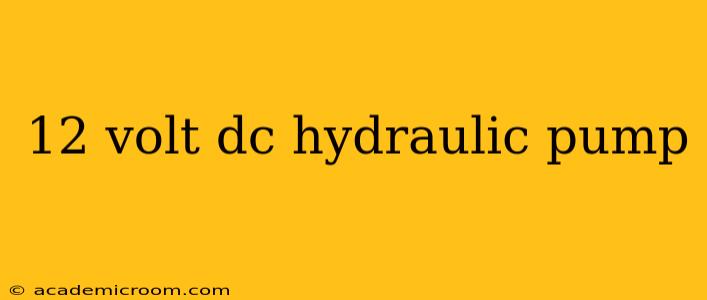Finding the right 12-volt DC hydraulic pump can feel overwhelming. This guide breaks down everything you need to know, from understanding different types to selecting the best pump for your specific application. We'll also address common questions to ensure you're equipped to make an informed decision.
What are 12 Volt DC Hydraulic Pumps?
12-volt DC hydraulic pumps are compact powerhouses that convert electrical energy into hydraulic power. They utilize a 12-volt direct current (DC) power source, typically a battery, to drive a hydraulic fluid, generating pressure to actuate hydraulic cylinders or motors. This makes them ideal for applications where a small, portable, and readily available power source is needed.
Types of 12 Volt DC Hydraulic Pumps
Several types of 12-volt DC hydraulic pumps exist, each with unique characteristics and applications:
1. Gear Pumps:
These pumps use meshing gears to move hydraulic fluid. They're known for their simplicity, reliability, and relatively low cost. However, they may not be suitable for high-pressure applications.
2. Vane Pumps:
Vane pumps utilize rotating vanes within a circular casing to pump fluid. They offer higher flow rates compared to gear pumps and can handle moderate pressures. They are a good balance of performance and cost-effectiveness.
3. Piston Pumps:
Piston pumps are the workhorses for high-pressure applications. They utilize reciprocating pistons to create high hydraulic pressure, making them suitable for heavy-duty tasks. However, they are generally more expensive and complex than gear or vane pumps.
4. Orbital Motors (Used as Pumps):
While primarily used as hydraulic motors, some orbital motors can operate in reverse, functioning as pumps in specific scenarios. They offer smooth operation and can deliver precise control.
Choosing the Right 12 Volt DC Hydraulic Pump: Key Factors
Selecting the appropriate pump depends on several critical factors:
-
Flow Rate (GPM or LPM): This indicates the volume of hydraulic fluid the pump can move per minute. Higher flow rates are needed for applications requiring faster actuation.
-
Pressure (PSI or Bar): This signifies the maximum pressure the pump can generate. Heavy-duty applications necessitate pumps with higher pressure capabilities.
-
Duty Cycle: This refers to the percentage of time the pump is operational during a given period. Continuous duty pumps operate constantly, while intermittent duty pumps operate in cycles.
-
Displacement: This represents the volume of fluid moved per revolution of the pump. It's directly related to flow rate.
-
Motor Type: While 12V is specified, you'll find pumps with different motor types (e.g., brushed, brushless) offering varying efficiency and longevity.
-
Mounting: Consider the available space and mounting options needed for seamless integration into your system.
How to Install a 12 Volt DC Hydraulic Pump
Installation procedures vary depending on the pump model. Always refer to the manufacturer's instructions. Generally, installation involves securely mounting the pump, connecting the hydraulic lines, wiring the power supply, and adding a reservoir for the hydraulic fluid. Proper priming is crucial before operation.
Maintaining Your 12 Volt DC Hydraulic Pump
Regular maintenance is vital to prolong the life of your pump. This includes:
- Fluid Level Checks: Ensure the hydraulic fluid reservoir is adequately filled.
- Fluid Condition: Check for contamination or degradation of the hydraulic fluid.
- Leak Detection: Regularly inspect for any leaks in the hydraulic lines or pump seals.
- Overheating: Monitor the pump's temperature to prevent overheating.
What are some common applications for 12-volt DC hydraulic pumps?
12-volt DC hydraulic pumps find applications in a surprisingly wide range of areas, including:
-
Mobile hydraulic systems: These pumps power various equipment in mobile applications, such as lifting mechanisms on trailers, dump trucks, or agricultural machinery.
-
Small-scale industrial equipment: They power hydraulic systems in smaller-scale manufacturing processes or automated systems.
-
Automotive applications: While less common than in heavy vehicles, some specialized automotive systems might use 12V DC hydraulic pumps.
-
Robotics: Smaller robots often utilize these compact pumps to drive their hydraulic actuators.
-
Recreational vehicles (RVs): Some RV systems incorporate them for leveling systems or other hydraulic functions.
What is the difference between a 12V DC hydraulic pump and a 12V AC hydraulic pump?
The key difference lies in the power source. DC pumps run directly off a 12-volt direct current supply (like a battery), while AC pumps require a 12-volt alternating current source and often an additional rectifier to convert the AC power to DC power needed for the pump's operation. DC pumps are typically preferred for mobile or portable applications because batteries provide readily available DC power.
Where can I buy a 12-volt DC hydraulic pump?
Many online retailers and hydraulic equipment suppliers sell 12-volt DC hydraulic pumps. It's crucial to specify your requirements (flow rate, pressure, etc.) before purchasing to ensure you select the correct pump for your project.
This guide provides a comprehensive overview of 12-volt DC hydraulic pumps. Remember to always prioritize safety and consult professional guidance when working with hydraulic systems. Choosing the right pump for your needs requires careful consideration of the factors discussed above. With the right information, you can confidently select and implement a 12-volt DC hydraulic pump for your specific application.
